.
THE CAR IS SILENT until we’ve left Saranac Lake and are headed towards Tupper, and then the road begins to wind and curve, to climb and descend, and we’re thrust into deep, swampy Adirondack forest. It’s a freezing day in January, and Pants, the cat, begins to fidget. She growls, a low, guttural sound that matches the car’s grumbling engine. I sing to her, and her tail swats at the mesh walls of her carrier. Finally, she turns away from me to face the passenger-side door. Through the mesh, I can see that her ears are pricked.
Pants, I say, and she yowls.
My father recommended this curving route through Blue Mountain Lake and Indian Lake, towns built on the shores of those bodies of water, white buildings with red roofs, Adirondack mountains in backyards. Those are the last of the High Peaks, my father had said, and then there’s nothing til you hit the Rockies.
I am bound for New Mexico: I have two friends there and a teaching job. My father thinks New Mexico is the least American of all of the states, and from the moment I told him about the job offer in Santa Fe, he rooted for it. He proposed to my mother at Taos, on a day when it was snowing. I don’t know much about my father’s cross-country trips, just that he took them periodically through and after college, crashing in cheap hotels and in tents and checking the maps for the routes with the most mountains. Once, as we were driving under a bridge on the Colorado interstate, my father said, I slept here once.
There are trees still around us, but soon there will be none; that’s when I’ll have to start trusting him.
Soon, I say to Pants, we won’t recognize this country at all.
We spend our first night in Rochester, which is farther west than I’ve ever driven from home. In the morning it feels so strange to get in the car for a second day and go farther. The landscape flattens, the spaces between houses lengthens, the road empties. We reach the Great Lakes and there is water to the right, to the north, long stretches of it that reveal themselves through breaks in the lines of trees. There’s nothing between the Adirondacks and New Mexico, my father had said, but he hadn’t mentioned that there’d be these. I’ve never seen the Great Lakes until now; we drive alongside water for miles and miles, wind whipping across the road and smacking the car.
Through Pennsylvania we drive; we sleep in Illinois. We sleep in Missouri. By Oklahoma, I’m starting to worry, for how blank and brown the landscape is, and how windswept Tulsa. Is this how New Mexico will be?
When I cross the border, though, I know I needn’t have worried. Everything instantly changes color. The wind stops its howling, blocked by the distant ranges. The land is red and green and brown and gold and studded with dark green shrubs. All that lines the road are occasional wire fences, occasional grazing cows, and the beautiful, sprawling land. The shift from northern Texas into New Mexico is miraculous.
Look, I say to Pants, but she’s gone to sleep.
The sun warms the car and we drive west, farther and farther from our old home and closer and closer to our new one. In the distance, I see snow on peaks. I’ve never driven this empty road before, but somehow, it feels familiar.
.
Desert Nights
In Santa Fe, they call the speed bumps, ‘speed humps.’ I hear equal parts Spanish and English in the grocery store, at the gas station, in the library. The terra cotta walls of the homes match the color of the earth, and the riverbed that runs alongside our street has formed itself of clay, of wind-blown sage, of crumbling stones and of the mountains that rise up in the distance. My roommate’s dog gets prickers in her paws and limps; a man stops us to tell me that they’re called goat-heads, those thorns.
You aren’t from here, are you? he says, when I ask him a second time what the prickers are called. We talk for ten minutes; the rain begins. He seems not to notice. I learn that the rain is rare but these types of conversations are not; in the shops, at the school, on the street, people talk. People slow down and wave me across the street; people smile.
Meanwhile, the rain gusts and wanes and then turns to snow. The air smells of piñon and smoke. People decorate their yards not with grass and flowers but with gray and white stones, with antlers bleached silver and with driftwood worn smooth. I hike in the woods; I peer into the windows of shops, decorated with chili-pepper lights, and glance at the paintings inside.
Just before darkness falls here, the sky turns violet, and in the early hours of morning the mountains glow pink. I wake in the night and look out my window; the sky is brittle, the moon a round and shimmering orb, the stars icy dots far above us. Pants purrs from the window, making peeping sounds at the tiny, hopping birds I cannot see.
Here we are, three thousand miles and six days from home. And so it begins, our new life: we’ve traded water for sky and tall trees for grass.
.
Dark Rooms
It’s hot in the classroom on the first day of my teaching job. Every seat is taken. I unpack my things, write my name on the board, announce that this is English 109, and I am the adjunct instructor. My new students suggest Red or Green? as a get-to-know-you question, and I’m the only one who doesn’t know what that means.
Be careful, they warn me when they learn I’ve come from the east coast. Start with green.
For their first essay, my students must write about a challenge they’ve overcome. From that very first set of papers, I learn that some of my students go home after class to hoards of children, who clamor over them. One has a mother who is silent all the time, and one has a father who hates fat people. One has an uncle who takes her into a dark room from time to time and closes the door. One has a father who burns her writing; one has a memory of a bad-smelling room, a winter afternoon, the first time he said good-bye.
One woman writes that she can still remember being locked in a closet as a child with a bucket and a dish of water on the floor. One man, who can’t be more than 22, has been to jail already twice. He has two daughters and a wife, and he teaches me what the word recidivism means.
When they read their stories aloud, their voices sometimes tremble. Sometimes people weep. We close the classroom door but take inside with us our families, our lovers, our road trips, our childhoods crumpled by domineering mothers, by a life without a father, by a sideways glance that almost killed us and by the gleam of a bottle, half-full. We remember hard times, but there is much beauty as well. Sometimes, words pour over us and bring us somewhere else, far from this room, this desert college, this date and time.
.
Arroyos
In New Mexico, Pants discovers the outdoors. A Boston cat before, she now routinely squirts out the screen door before I have time to stop her. She darts to the smooth cement patio and rolls there with urgency; her tail thickens and the strip of fur along her back raises to a ridge. I can hear her purring throatily as she jumps the stone fence, skitters up the cedar tree, races down the stairs to the cellar door. She sniffs everything: the air, the trees, the stones, and I chase her out of the yard and into the desert, up and down the rolling hills and along the sandy arroyo.
While I’m out, I sometimes imagine Pants lying pressed against the window, a screen the only barrier between her and a world she is dying to learn. I imagine her slipping out and my chasing her, farther and farther each time until eventually I chase her right out of sight. Is letting her leave a sign of love? Must I trust that she’ll return, and that between the trees and on the dirt is where she most wants to go? I go over to pet her. We’ll have to find out a better system, I tell her, and she gazes out at the birds on the stone fence, then up at me.
It’s only a matter of time, her green eyes say, and I wonder where she sends herself when her eyes are closed. Are her dreams a river of scents and gusts of wind?
.
American Roads
I learned to drive in Boston, sharp turns and quick blinkers and the pedal constantly pressed against the metal. In New Mexico, I learn that yes, some people actually are out on leisurely Sunday drives, despite it not necessarily being Sunday. People drive slowly, and they don’t use their signals. It’s not unusual to share the road with a trucker, an immigrant boy in his grandfather’s ancient Ford, a tractor going thirty miles under the speed limit, a couple of horses galloping alongside the road. A pickup pulling a trailer, a horse’s head sticking out the window, its main fluttering in the breeze.
The oldest cars you’ll see in America can be found here in New Mexico, because our environment is just right for them—no salt, hardly any rain, and no moisture. Dry. High. Only the sun can hurt your car, peeling the paint over the course of months and years, bleaching your roof and hood bright white. Gas is the cheapest in the nation, I am told.
.
Windows
Winter rolls into spring, and the sky is a seamless blue. The air grows warm but never muggy, and even in the nighttime everything smells of baked pine. Stars fill up the sky. I walk down empty roads. At nighttime, coyotes come eerily close, their cries like human wails, frightening and familiar both. Pants watches them in the darkness; out my apartment windows, there’s always someone to watch. Birds live in a nest in the rafters, and beetles creep over the brick floor.
The seasons pass, and I feel my world broaden a little more each day—a new friend, a new trail to ski, a new view of distant Albuquerque. A new town, nestled in the hills, where the residents paint their houses teal and salmon and sell expensive turquoise and painted bones.
At the community college, I learn to start my lessons late. Only half the class is ever there when I arrive, and missing ten or a dozen students, I discover, is normal. This is the New Mexico way, I quickly realize. You ease into things here.
And so I start my lessons at ten minutes to nine. Students trickle in, people arriving as late as ten o’clock, and not even sheepish. They are a laid back group—sometimes too laid back when it comes to staying awake in class, turning in essays on time, avoiding words like u and thru and nowofdays. Trying not to write dessert when what they’re really describing is the desert in which they live. People look out the windows a lot; I learn not to scold but to ignore.
.
Fires
The semester ends, and the campus empties. The smell of fires from the Jemez Mountains thickens the air. Fire season, people say to each other in the grocery store, shrugging their shoulders, peering out the windows. The smoke smells sweet and strange.
.
Open Doors
On the fourth of July, I wake up and the door is open and Pants is gone. She never goes out at night; the coyotes are rampant, now that we’re in a drought. There’s no food, no water, and so they come scavenging in our yards.
I run out into the darkness, barefoot, not even feeling the goat-heads. I am shivering; my heart is pounding. She doesn’t come, and she doesn’t come. For an hour I stumble, calling her name. In the morning, she still doesn’t come. I walk weeping through the neighborhood, pasting up signs and knocking on the doors of complete strangers, who are kind and take my number and give me a drink of water. They tell me they’ll call if they see anything, and no one is cruel enough to mention the brazen coyotes that sing every night.
Months pass, and still I don’t give up hope. I wait for someone to find her in a garage. I walk the neighborhood, softly calling her name. Only when winter comes do I finally stop looking; when the first snow of the season falls, I go outside and kneel in the brown grass and close my eyes. There is no stone for her, nothing to bury that she left behind. I pray that she’s found her place between the trees and coyotes, the hawks, the velvet nights, the sun and moon. I listen hard, but only the wind comes.
A hundred times I will think of the open door, the wind and the darkness beyond, the chattering night and the sliver of moon. I’ll imagine cooling jewels of fireworks. I will think again and again of that night, when something wild came and took her away.
American Roads
Where I live, the days are long and clay-colored. By March, waves of heat blow in through the windows. Spring Break comes and goes, and my students start to fidget. People wear flip flops to school. Young women bare their bellies and guys their muscled arms, wound in tattoos. Trees begin to bud. We taste summer early here.
Now, I live on the plains with a long-haired man; we find pot shards in the garden every year. The mesa in the distance is long and red. There are trailers out here and old burial mounds, tiny adobe churches with bells mounted to the roofs. A peacock screams in the morning, and at dusk, coyotes come.
I have another cat, calico like Pants was, but this one came with a nipped ear and a strong desire never to go outside. She skitters away from open doors, content to purr and blink and flick her tail at the window. She also came with a name: Mora, after a northern New Mexico town. Pants is dust and sage now, dust and sage and piñon and wind.
The desert has taught me to pray for rain. I search the sky for clouds, and when the drops finally fall, I can smell water before it hits the ground. The scent creeps in through adobe walls. I can hear it on the roof. I stop what I am doing and listen and breathe, because I have learned what it means to wait for water.
This desert is at turns bitter and wild, sweet and enchanted. Tonight, the sky is the color of a cactus bloom. My father doesn’t blame me for never wanting to leave: he comes to visit; we ski at Taos; we hike in the canyons. He sees what this place has done to me: I am a teacher now, and in the summers I am a writer and a farmer. Money matters to me less than it did before. Pot shards line the windowsill, and the cat eats cobwebs on the stairs.
—Kate McCahill
.
Kate McCahill’s essays have been featured in Best Women’s Travel Writing and Best Travel Writing (Travelers’ Tales), The Lowestoft Chronicle, Wellesley Magazine, Numéro Cinq, and elsewhere. Born in Lake Placid, New York, McCahill now lives in Santa Fe, New Mexico, and is a member of the English faculty at the Santa Fe Community College. Read more at www.katemccahill.com.


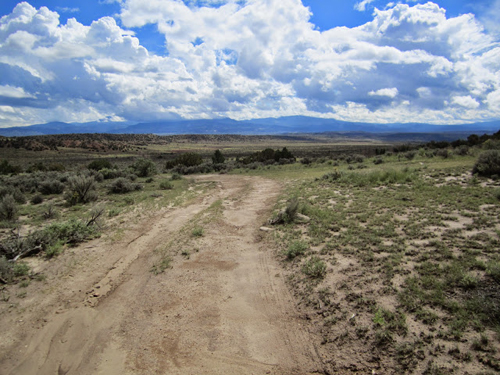


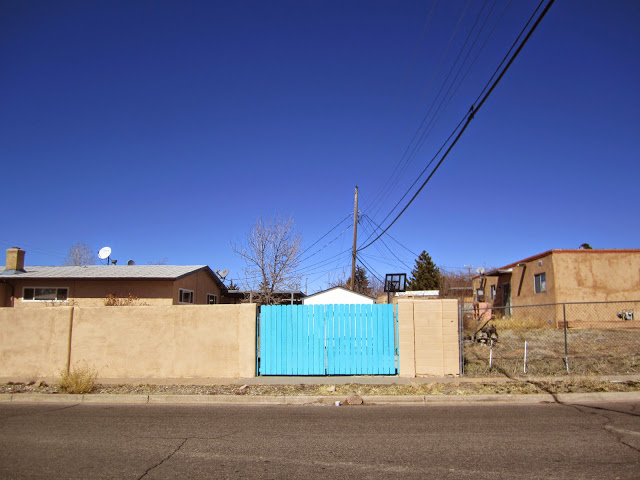
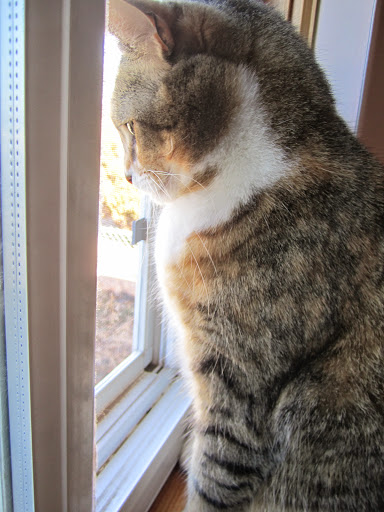
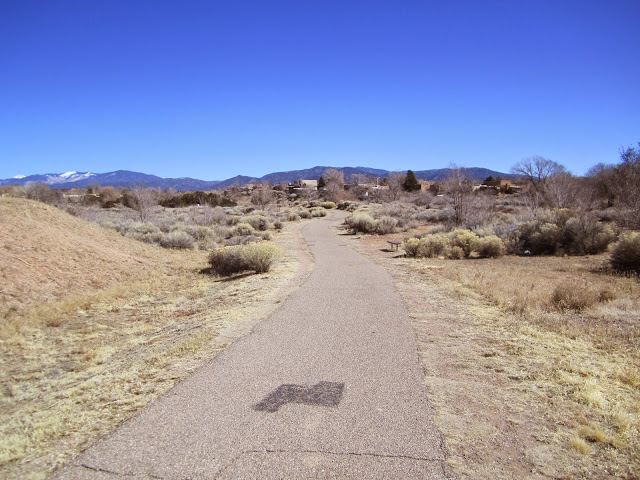


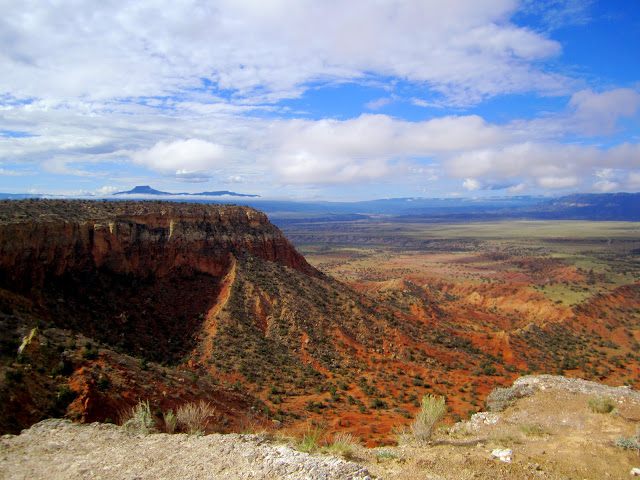


What It’s Like Living Here series. I have reached Nirvana. Vicarious voyages to foreign climes, near and far, combined with truly top-drawer writing. My cup runneth over, Numéro Cinq!
Kate, your writing is so wonderful.
It seem like only last week we were at VCFA.
My very best to you.
Tony
I was enjoying the descriptions and the pictures but got quite a jolt when Pants disappeared. Sorry for your loss, Kate.
I loved finding this 3 days before we begin our drive from Boston to Santa Fe, driving 2 cars, our new rescue cat (a calico!) in one, the 2 dogs in the other. It’s been a dream to live in Santa Fe, and after 25 years in Boston, the time has come. It’s bittersweet, even though I never felt the Boston area was “home” – I’m from New York City, maybe that has a lot to do with it. Reading about your drive into NM and your description of Santa Fe has reminded me to breath for a second and think about our view, the hiking, the smell of the pinons, although the juniper is my favorite. Thank you for your post, it’s reminded me to be excited among the goodbyes!
I’m reading your book and enjoying it. But why did you take a photo of our neighbor’s gate and frame it with horror stories that make us sound like we’re all living in desperation, amorality, and poverty? I’m hoping its placement was just a coincidence. And also that you have learned that this really is America and that the people here are very normal and in fact more civilized than most other places in America. They show up on time to work, too. They work as hard as anyone and are kinder to their children. Reading this essay, I’m wondering if your stories about Central America have the same slant tainted with privilege.
Enjoyed reading your story of life in NM.Sorry about your cat.